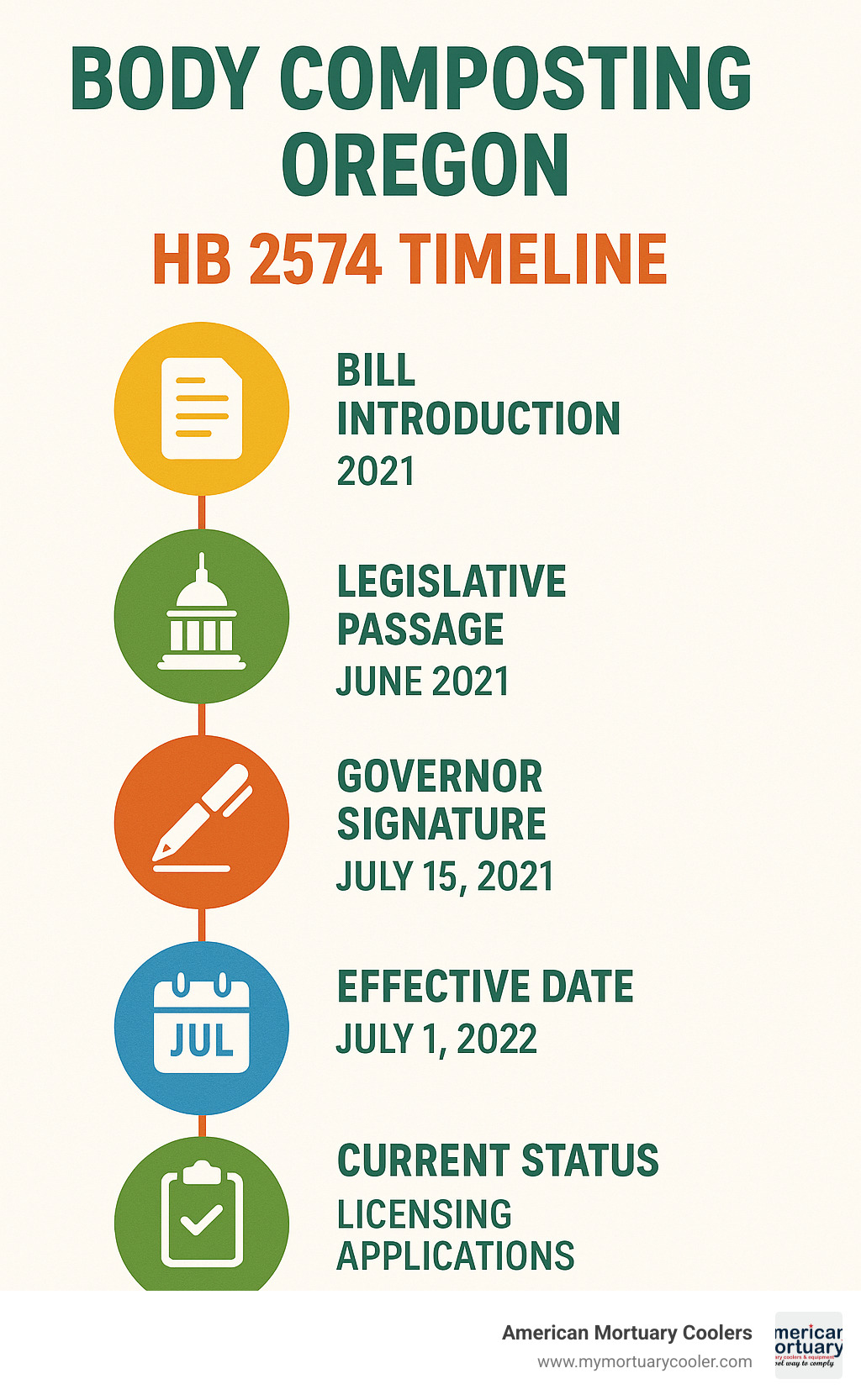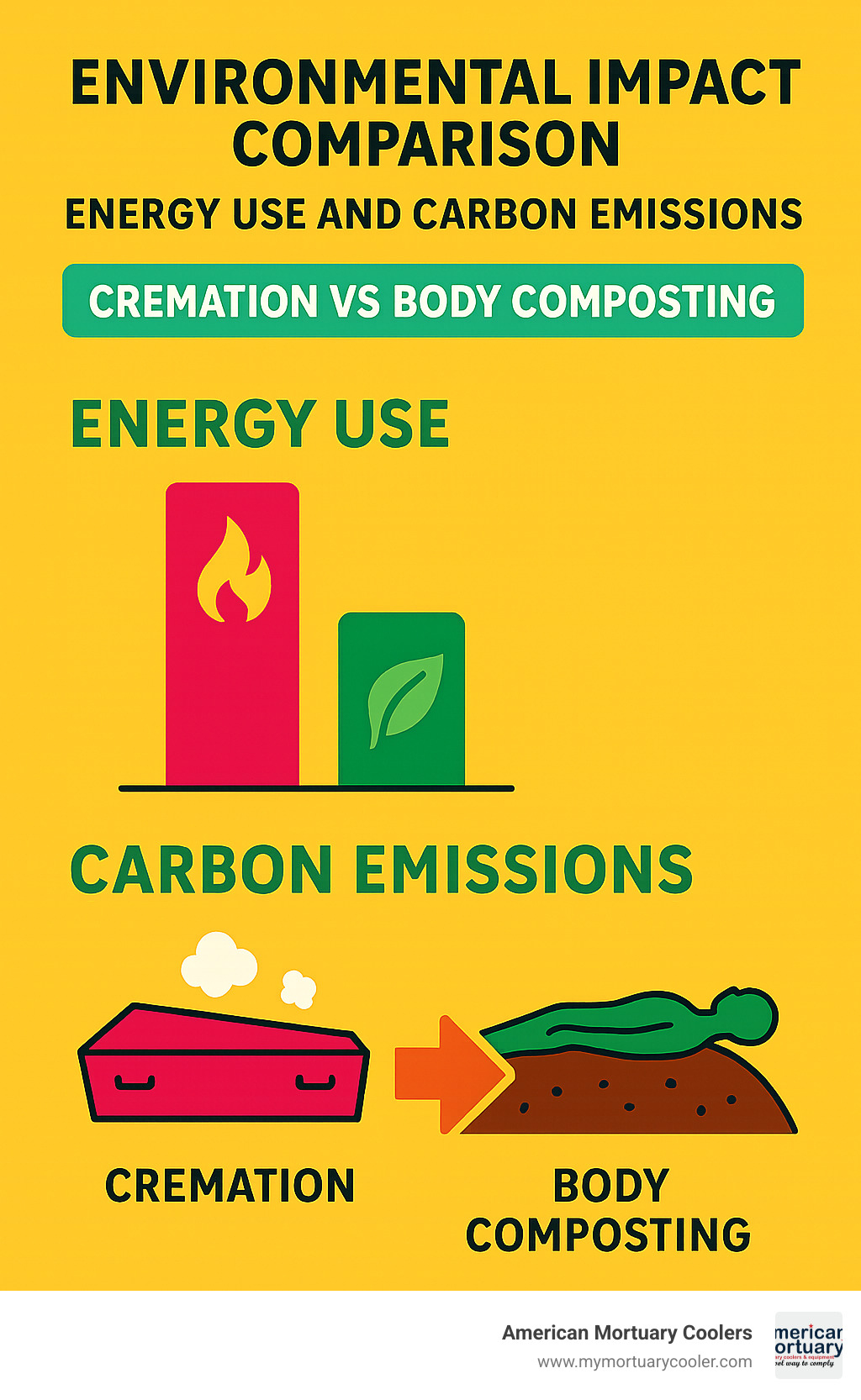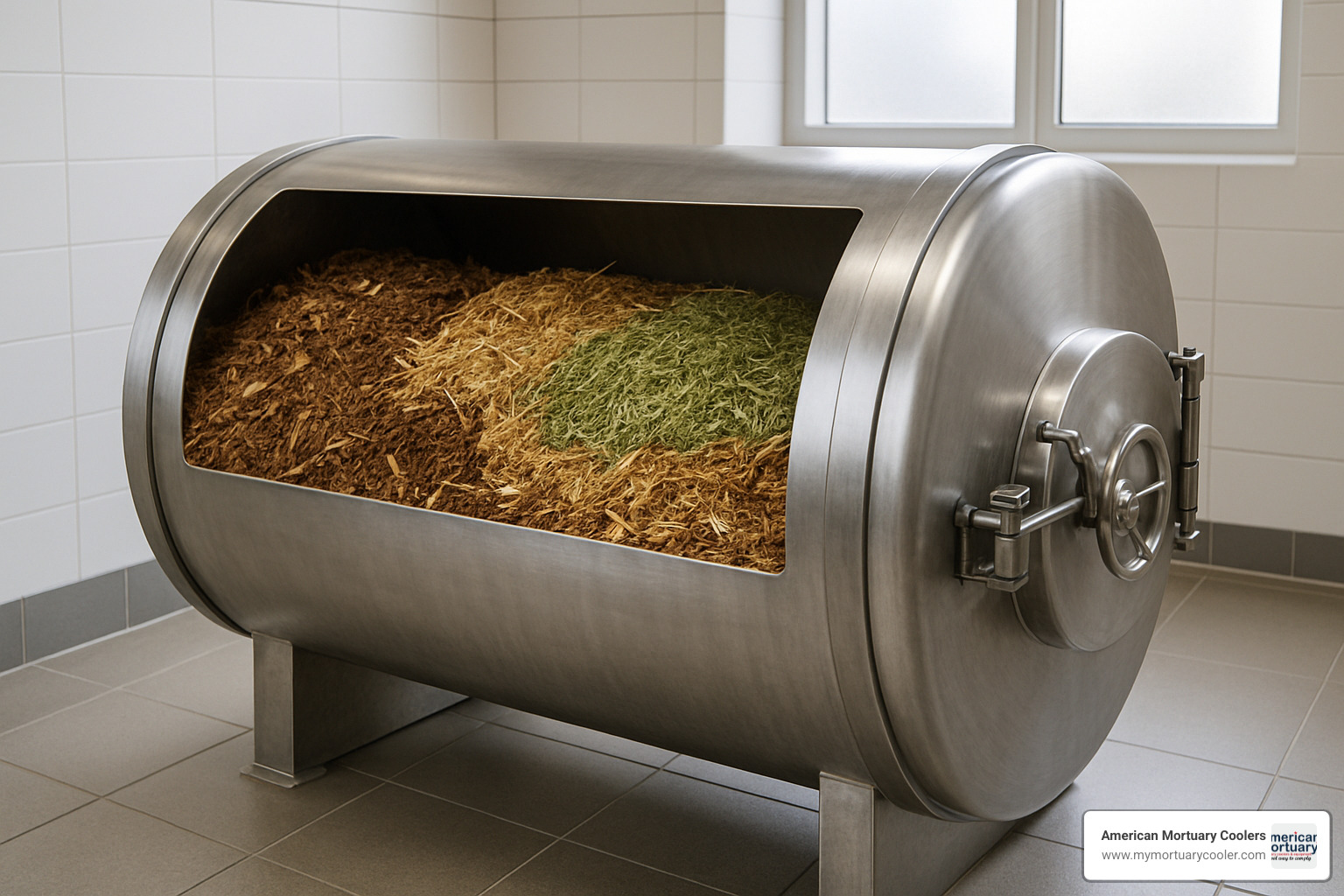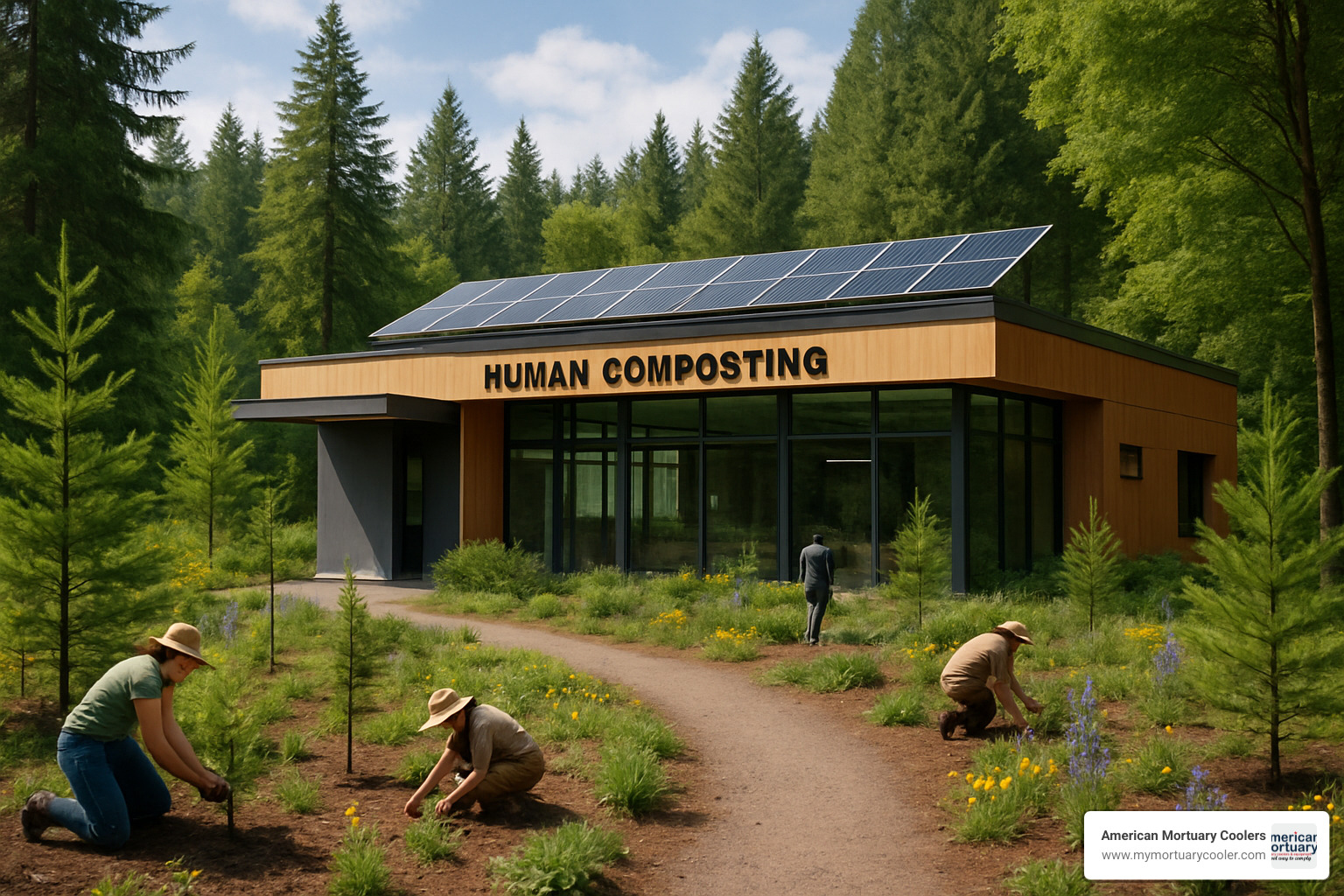Why Oregon's Body Composting Laws Matter for Funeral Professionals
Body composting oregon became legal on July 1, 2022, when Governor Kate Brown signed House Bill 2574 into law, making Oregon the third state to allow this eco-friendly alternative to burial and cremation.
Quick Facts About Body Composting in Oregon:
- Legal Status: Fully legal since July 1, 2022 under HB 2574
- Process: Natural organic reduction transforms bodies into soil over 8-12 weeks
- Cost: Around $7,000 (compared to $8,300 for burial, $6,280 for cremation)
- Environmental Impact: Uses 87% less energy than cremation, prevents 1 metric ton of CO₂
- Licensing: Regulated by Oregon Mortuary and Cemetery Board
- Current Providers: No licensed facilities in Oregon yet, but several companies serve Oregon residents through out-of-state facilities
Oregon's legalization represents a major shift in how Americans think about death care. The law allows funeral homes to offer natural organic reduction - a process that uses microbes, heat, and organic materials like wood chips and straw to transform human remains into nutrient-rich soil over approximately three months.
This sustainable option addresses growing environmental concerns about traditional burial and cremation. While conventional burial uses toxic embalming chemicals and takes up valuable land, and cremation releases significant CO₂ emissions, body composting actually improves the environment by creating healthy soil that can restore forests and sequester carbon.
I'm Mortuary Cooler from American Mortuary Coolers, and I've been helping funeral homes nationwide prepare for emerging disposition methods like body composting oregon for over a decade. As more states legalize human composting, funeral directors need reliable equipment and clear guidance to serve families choosing this growing green burial option.

Simple body composting oregon glossary:
Why This Guide Matters
As funeral professionals, we're witnessing a fundamental shift in how families approach end-of-life choices. The demand for sustainable funeral options continues to grow, with 64% of Americans expressing interest in green burial alternatives. Oregon's body composting law positions the state at the forefront of this movement, offering families an option that aligns with their environmental values while providing meaningful closure.
Understanding Human Composting Basics
Body composting oregon works by recreating the ideal conditions for natural decomposition inside a specially designed vessel. The process starts when a body is gently placed in a steel container along with organic materials like wood chips, alfalfa, and straw. These materials provide the perfect recipe of carbon and nitrogen that microbes need to thrive.
The magic happens through an aerobic process - meaning the microbes need oxygen to do their work. This is completely different from the anaerobic decomposition that happens in traditional burial, where lack of oxygen creates harmful byproducts. Instead, the controlled airflow in human composting vessels creates conditions where beneficial microbes can transform everything into clean, nutrient-rich soil.
Over 8 to 12 weeks, approximately one cubic yard of beautiful, fertile soil emerges from each person. Families often describe this soil as looking and smelling like the rich earth you'd find in the best gardens - because that's exactly what it is.
Environmental Impact & Benefits
The numbers behind human composting are remarkable. Each body composting oregon process uses 87% less energy than cremation, which has to maintain scorching temperatures of 1,600°F for hours. Even more impressive, every person who chooses human composting prevents about 1 ton of CO₂ from entering our atmosphere.

Traditional cremation produces about 535 pounds of CO₂ - equivalent to the emissions from driving over 600 miles. Human composting flips this equation entirely. Instead of releasing carbon, the process actually helps with carbon sequestration as the finished soil supports plant growth that pulls CO₂ from the air.
Scientific research on carbon savings shows each human composting event prevents 0.84 to 1.4 metric tons of CO₂ equivalent emissions - and those benefits keep growing as the compost nourishes plants that continue sequestering carbon.
Bones, Teeth & Medical Implants
Bones and teeth don't decompose during the initial composting phase, so they're carefully removed and processed into a fine bone powder using specialized equipment. This powder gets mixed back into the compost, where it adds important minerals and helps balance the soil's pH.
Any medical implants like pacemakers, hip replacements, or surgical screws are separated out during screening. Many facilities work with recycling programs to give these materials new life rather than sending them to landfills. All facilities must meet strict safety standards for the finished soil, including testing for pH levels, nutrient content, and confirming that the composting process eliminated any harmful pathogens.
Body Composting Oregon Laws & Regulations
Oregon's approach to regulating body composting oregon reflects the state's commitment to both innovation and safety. The Oregon Health Authority handles the vital records side of things, while the Oregon Mortuary and Cemetery Board oversees facility licensing and operations.
History of Legalization (2021-2022)
The story of body composting oregon legalization begins with Representative Pam Marsh, who introduced House Bill 2574 in 2021. Over 100 individual Oregonians wrote letters backing the bill, sharing personal stories about why sustainable disposition mattered to them and their families.
HB 2574 passed both chambers of the Oregon Legislature with near-unanimous support. Governor Kate Brown signed the bill into law on July 15, 2021, with an effective date of July 1, 2022. Oregon became the third state to accept human composting, following Washington and Colorado's pioneering efforts.
Licensing & Facility Requirements
Oregon's licensing requirements for human composting facilities mirror the rigorous standards applied to other disposition businesses. The Oregon Mortuary and Cemetery Board handles all facility licensing and ongoing oversight.
Facilities need specialized infrastructure including composting vessels, sophisticated ventilation systems, and screening equipment. The More info about room specs details the preparation room specifications under OAR 830-040-0020.
At American Mortuary Coolers, we've been working closely with facilities across multiple states to understand the equipment needs for human composting operations. Our experience shows that proper refrigeration, ventilation, and handling equipment form the backbone of compliant operations.
While the regulatory framework is in place, no facilities have received licenses to operate human composting services in Oregon yet, representing a significant opportunity for forward-thinking funeral homes.
Paperwork, Transport & Eligibility
The administrative side of body composting oregon involves specific procedures that funeral directors need to master. The Oregon Health Authority on HB 2574 walks through the key requirements step by step.
Death certificates for natural organic reduction cases use new coding in the OVERS system. The lack of licensed facilities in Oregon doesn't prevent Oregon families from choosing human composting. Companies like Recompose, Return Home, and Earth Funeral actively serve Oregon residents by coordinating transport to their licensed facilities in Washington State.
Organ donation works perfectly with human composting. Medical professionals remove organs immediately after death for transplantation, and the body can undergo composting afterward without any complications.
Step-by-Step Process of Human Composting in Oregon

When families choose body composting oregon, they're starting on a journey that transforms their loved one into something that can nurture new life. The process isn't complicated, but it is precise.
Timeline & Key Milestones
The complete body composting oregon process unfolds over 8 to 12 weeks, divided into two distinct phases. The vessel phase takes up the first 5 to 7 weeks. The body rests in a specially designed stainless steel vessel alongside carefully chosen organic materials - wood chips, alfalfa, and straw.
Temperature becomes crucial during these weeks. The microbial activity generates heat naturally, pushing temperatures above 131°F. This heat speeds up the decomposition process and eliminates any harmful pathogens, ensuring the finished soil is completely safe.
The curing phase follows, lasting another 3 to 5 weeks. During this time, the composted material settles and stabilizes. The pH balances to between 6.5 and 7 - perfect for most plants.
Family Experience & Memorial Options
What sets human composting apart is how much families can participate in the process. Many providers encourage families to participate in a laying-in ceremony before the composting begins. Families can decorate the vessel with photos, flowers, and meaningful objects.
Return Home, which serves Oregon families from their Washington facility, offers something unique - they're the only provider that allows in-person laying-in services and family visits throughout the process.
When the process completes, families can receive a small portion of the soil for a memorial garden or take home the entire cubic yard. Many families plant trees in their loved one's honor, create dedicated garden spaces, or scatter the soil in places that held special meaning.
Conservation donation offers another path for families who want their loved one to contribute to something larger. Unused soil can support forest restoration projects, habitat creation, or other environmental initiatives.
Soil Volume & Uses
Each person who undergoes human composting creates approximately one cubic yard of finished soil - that's roughly 500 to 1,000 pounds of nutrient-rich compost. The finished soil has a balanced pH between 6.5 and 7, making it perfect for most plants and gardening applications.
Families use this soil in countless meaningful ways: memorial gardens, trees that will grow for generations, vegetable gardens, houseplant soil amendment, and forest restoration projects. The beauty of receiving this much soil is that families don't have to choose just one use.
Costs, Providers & Planning Ahead
When Oregon families consider body composting oregon, understanding the financial landscape helps them make informed decisions. Human composting costs fall right between traditional burial and cremation, making it accessible for many families who want an environmentally conscious option.
Price Comparison & Payment Options
Body composting oregon services typically cost around $7,000 - positioned between cremation at $6,280 and burial at $8,300. This pricing reflects the specialized equipment and extended timeline required for the composting process.
Most providers accept transparent, all-inclusive pricing with no surprise fees. Precompose plans allow families to spread costs over time through monthly payments, similar to other pre-need funeral arrangements. Community funds represent something special in the human composting world, with many providers maintaining assistance programs to help families who might not otherwise afford human composting.
Our Cheat Sheet to Body Composting Costs breaks down all the financial details you need to know.
Current & Future Oregon Providers
While body composting oregon is fully legal, no facilities operate within the state yet. Oregon families currently work with established providers in Washington State.
Recompose leads the industry with their Seattle facility featuring 74 custom-designed vessels. Return Home offers a gentler approach through their Auburn, Washington facility, using passive composting without mechanical rotation. Earth Funeral operates their state-of-the-art facility using 100% renewable energy.
The absence of Oregon facilities creates a significant opportunity. Forward-thinking funeral directors could establish the first body composting oregon facility and serve the growing demand locally. At American Mortuary Coolers, we've been preparing for this moment with the specialized refrigeration, handling equipment, and facility design expertise successful operations need.
Pre-Plan, Insurance & Organ Donation
Advance directives should specifically mention human composting as your preferred disposition method. Pre-need contracts with human composting providers offer peace of mind and financial benefits by locking in current pricing and reducing decision-making pressure on your family.
Insurance coverage for human composting varies between policies. Many life insurance policies cover any legal disposition method, which includes human composting in Oregon. Pre-need funeral insurance typically covers human composting since it's a recognized legal disposition method.
Organ donation compatibility represents one of the best aspects of human composting - you can honor both your desire to help others and your environmental values. Medical professionals handle organ recovery immediately after death, then your body can proceed to composting.
Body Composting vs. Other Green Burial Options
When families explore eco-friendly alternatives to traditional burial, body composting oregon represents just one of several environmentally conscious options available in the state.
| Disposition Method | Cost Range | Environmental Impact | Timeline | Soil/Remains |
|---|---|---|---|---|
| Body Composting | $7,000 | 87% less energy than cremation, 1 ton CO₂ saved | 8-12 weeks | 1 cubic yard nutrient-rich soil |
| Cremation | $6,280 | 535 lbs CO₂ emissions, high energy use | 3-4 hours | 3-5 lbs ash |
| Alkaline Hydrolysis | $2,500-$4,000 | 90% less energy than cremation | 3-4 hours | Bone fragments, sterile liquid |
| Natural Burial | $1,000-$4,000 | Minimal impact if no embalming | Immediate | Natural decomposition in earth |
Human composting stands out because it actively improves the environment rather than simply minimizing harm. While cremation reduces the body to ash through high-heat burning, and alkaline hydrolysis dissolves tissue using water and alkali, body composting creates something genuinely beneficial - nutrient-rich soil that can restore forests and sequester carbon for decades.
Environmental Metrics & Land Restoration
The environmental impact of body composting oregon extends far beyond the immediate carbon savings. The soil created through human composting actively sequesters carbon as it supports plant growth. Trees and plants grown in this nutrient-rich soil continue capturing CO₂ from the atmosphere for years or even decades.
Several human composting providers demonstrate this regenerative approach through dedicated conservation projects. Earth Funeral maintains five acres on the Olympic Peninsula where donated soil supports forest restoration efforts.
The finished soil has a pH range of 6.5-7, making it ideal for most plants and restoration applications. Compared to other green options, human composting uniquely transforms the human body into something that actively heals damaged ecosystems.
Religious & Cultural Considerations
Navigating religious and cultural perspectives on human composting requires sensitivity and understanding. The Catholic Church has officially opposed human composting on doctrinal grounds. Many other religious traditions and secular families find human composting beautifully aligned with values of environmental stewardship and returning to the earth.
Secular families increasingly choose human composting as a practical expression of environmental values and scientific understanding of natural cycles. At American Mortuary Coolers, we've worked with funeral homes serving diverse communities, and families appreciate when funeral directors can discuss all available options respectfully.
Frequently Asked Questions About Body Composting Oregon
When families first learn about body composting oregon, they naturally have questions about how the process works. Let me walk you through the most common questions we get about human composting in Oregon.
How long does the process take from start to finished soil?
The journey from body to soil takes 8-12 weeks total. The process happens in two distinct phases. During the first 5-7 weeks, your loved one rests in a specialized composting vessel surrounded by organic materials. Natural microbes generate heat over 131°F that both speeds decomposition and eliminates harmful bacteria.
The second phase, called curing, lasts another 3-5 weeks. This is when the soil stabilizes and develops the balanced pH and nutrient levels that make it perfect for plants. Most providers send regular updates during these weeks, and some even let families visit or check on progress.
Can non-Oregonians choose body composting in Oregon?
Right now, it's actually the opposite situation. Body composting oregon is legal, but no facilities have opened yet in the state. So Oregon families who want this option currently travel to Washington State facilities like Recompose or Return Home.
Once Oregon facilities do open, they'll almost certainly welcome out-of-state residents. Washington and Colorado facilities already serve people from across the country, including many Oregon families.
What paperwork is required for transporting remains across state lines?
The documentation requirements are straightforward - similar to what's needed for any other disposition method involving transport. You need a death certificate, a transit permit, and proper identification of the remains.
Oregon funeral directors use the OVERS system to code natural organic reduction cases correctly. The Oregon Health Authority created a helpful job aid specifically for HB 2574 cases. What works best is when the composting provider takes the lead on interstate coordination - companies like Recompose and Return Home have this process down to a science.
Conclusion

Body composting oregon isn't just another funeral option - it's a glimpse into the future of how we honor our loved ones while caring for the planet they leave behind. When Governor Kate Brown signed HB 2574 into law, Oregon joined a movement that's quietly changing American death care, one family at a time.
The numbers tell a compelling story. Each person who chooses human composting saves one metric ton of CO₂ and creates a cubic yard of life-giving soil. Multiply that by the thousands of families already choosing this option nationwide, and you start to see forests restored, gardens flourishing, and carbon pulled from the atmosphere instead of added to it.
At American Mortuary Coolers, we've watched this industry evolution unfold across multiple states. The conversations we have with funeral directors today are vastly different from those we had a decade ago. Families want options that reflect their values, and body composting oregon delivers exactly that.
The opportunity for Oregon funeral homes is significant. Right now, Oregon families choosing human composting must work with out-of-state facilities, adding complexity and cost. The first Oregon facilities to offer these services will serve not just local families, but likely draw clients from across the Pacific Northwest.
Our More info about human-composting equipment shows just how much the industry infrastructure has evolved. What seemed impossible just a few years ago now represents a growing segment of the funeral industry.
The future of green death care extends far beyond human composting alone. We're seeing innovation in sustainable caskets, renewable energy-powered facilities, and conservation partnerships. Oregon's acceptance of body composting oregon positions the state at the forefront of this broader change.
For families reading this guide, know that choosing human composting means choosing hope. It means believing that even in death, we can contribute to life. The shift toward sustainable death care reflects something deeper - a growing understanding that our choices matter, even our final ones.
















